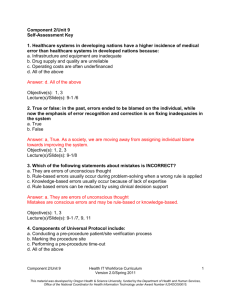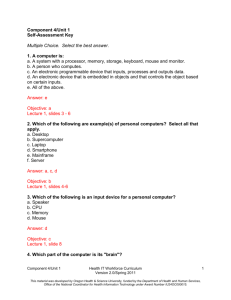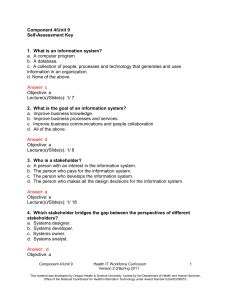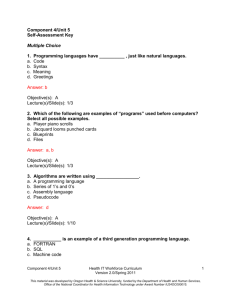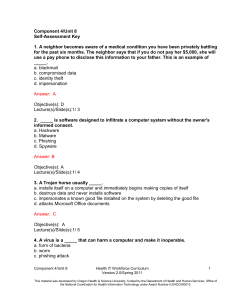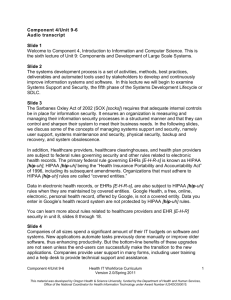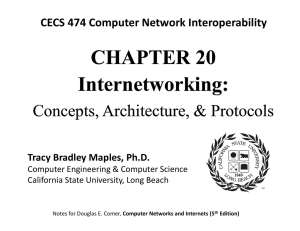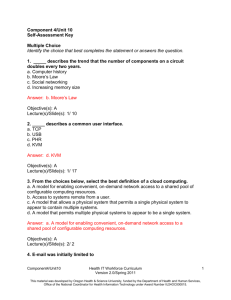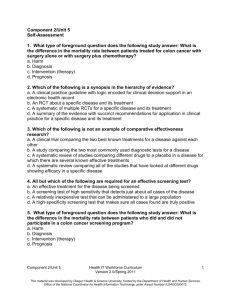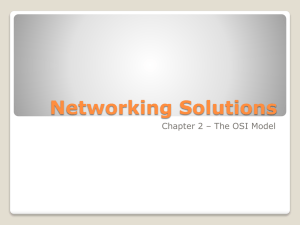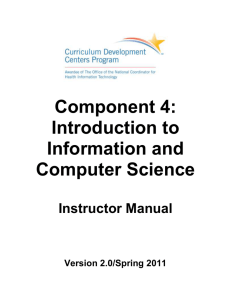comp4_unit7_self-assess_key
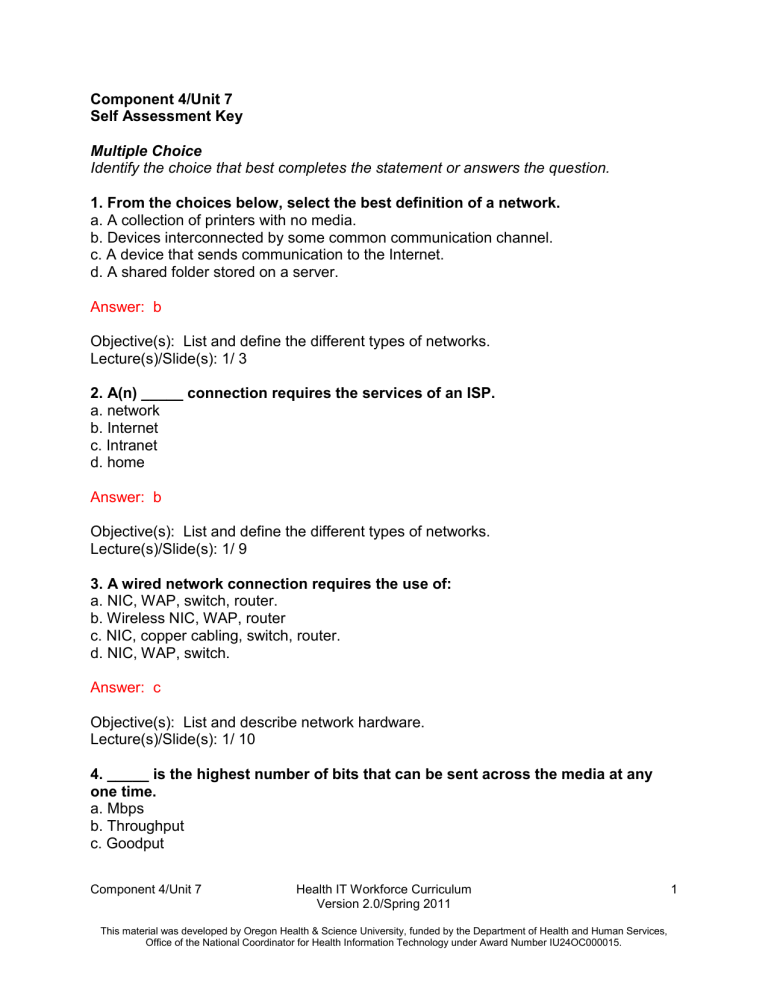
Component 4/Unit 7
Self Assessment Key
Multiple Choice
Identify the choice that best completes the statement or answers the question.
1. From the choices below, select the best definition of a network. a. A collection of printers with no media. b. Devices interconnected by some common communication channel. c. A device that sends communication to the Internet. d. A shared folder stored on a server.
Answer: b
Objective(s): List and define the different types of networks.
Lecture(s)/Slide(s): 1/ 3
2. A(n) _____ connection requires the services of an ISP. a. network b. Internet c. Intranet d. home
Answer: b
Objective(s): List and define the different types of networks.
Lecture(s)/Slide(s): 1/ 9
3. A wired network connection requires the use of: a. NIC, WAP, switch, router. b. Wireless NIC, WAP, router c. NIC, copper cabling, switch, router. d. NIC, WAP, switch.
Answer: c
Objective(s): List and describe network hardware.
Lecture(s)/Slide(s): 1/ 10
4. _____ is the highest number of bits that can be sent across the media at any one time. a. Mbps b. Throughput c. Goodput
Component 4/Unit 7 Health IT Workforce Curriculum
Version 2.0/Spring 2011
This material was developed by Oregon Health & Science University, funded by the Department of Health and Human Services,
Office of the National Coordinator for Health Information Technology under Award Number IU24OC000015.
1
d. Bandwidth
Answer: d
Objective(s): List and describe the various types of network communications and network addressing.
Lecture(s)/Slide(s): 1/ 11
5. _____ is the number of bits sent across the media at any one time that represent your computer’s actual communication. a. Mbps b. Throughput c. Goodput d. Bandwidth
Answer: b
Objective(s): List and describe the various types of network communications and network addressing.
Lecture(s)/Slide(s): 1/ 11
6. A _____ IP address can change when you reboot your ISP device. a. dynamic b. static c. DNS d. public
Answer: a
Objective(s): List and describe the various types of network communications and network addressing.
Lecture(s)/Slide(s): 1/ 18
7. Private IP addresses _____. a. have meaning on the Internet and in a home network b. have no meaning outside of the home network in which the address resides c. are the same thing as public IP addresses d. None of the above.
Answer: b
Objective(s): List and describe the various types of network communications and network addressing.
Lecture(s)/Slide(s): 2/ 9
Component 4/Unit 7 Health IT Workforce Curriculum
Version 2.0/Spring 2011
This material was developed by Oregon Health & Science University, funded by the Department of Health and Human Services,
Office of the National Coordinator for Health Information Technology under Award Number IU24OC000015.
2
8. From the list below, select a valid IPv4 address and subnet mask for a laptop: a. 192.168.256.1, 255.255.0.0 b. fe80:0cd0:2414:dc09:e6f5:23b1:528f:7fe2, /23 c. 192.168.10.200, 255.255.255.0 d. 192.168.10.0, 255.255.265.0
Answer: c
Objective(s): List and describe the various types of network communications and network addressing.
Lecture(s)/Slide(s): 2/ 6
9. The _____ is used by switches for intranet communications and has no meaning outside of that local network. a. IP address b. subnet mask c. HTTP protocol d. MAC address
Answer: d
Objective(s): List and describe the various types of network communications and network addressing.
Lecture(s)/Slide(s): 2/ 7
10. A domain name is an identification label that defines a realm of administrative autonomy, authority, or control on the Internet, based on the
_____. a. Domain Name System b. IEEE 802.3 standard c. Whitehouse d. ICANN
Answer: a
Objective(s): List and describe different network standards and protocols.
Lecture(s)/Slide(s): 2/ 11
11. The IEEE 802.3 standard governs ____ technologies. a. Ethernet b. Wi-Fi c. Bluetooth
Component 4/Unit 7 Health IT Workforce Curriculum
Version 2.0/Spring 2011
This material was developed by Oregon Health & Science University, funded by the Department of Health and Human Services,
Office of the National Coordinator for Health Information Technology under Award Number IU24OC000015.
3
d. WiMAX
Answer: a
Objective(s): List and describe different network standards and protocols.
Lecture(s)/Slide(s): 3/ 3
12. The IEEE 802.11 standard governs ____ technologies. a. Ethernet b. Wi-Fi c. Bluetooth d. WiMAX
Answer: b
Objective(s): List and describe different network standards and protocols.
Lecture(s)/Slide(s): 3/ 3
13. In Windows peer-to-peer networking, a workgroup is simply a _____. a. domain name b. server concept c. name for the network d. protocol
Answer: c
Objective(s): List and define the different types of networks.
Lecture(s)/Slide(s): 3/ 5
14. A _____ is a network with a small geographical area of coverage. a. LAN b. WAN c. MAN d. TAN
Answer: a
Objective(s): List and define the different types of networks.
Lecture(s)/Slide(s): 3/ 4
15. A _____ topology describes how a network is actually designed and laid out across a campus. a. logical b. physical
Component 4/Unit 7 Health IT Workforce Curriculum
Version 2.0/Spring 2011
This material was developed by Oregon Health & Science University, funded by the Department of Health and Human Services,
Office of the National Coordinator for Health Information Technology under Award Number IU24OC000015.
4
c. mesh d. star
Answer: b
Objective(s): Describe different network topologies.
Lecture(s)/Slide(s): 3/ 9
16. Computers in a _____ topology will usually be interconnected via a switch. a. logical b. physical c. router d. full mesh
Answer: d
Objective(s): Describe different network topologies.
Lecture(s)/Slide(s): 3/ 12
17. Protocols such as _____ allow any browser to talk to any Web server. a. HTTP b. SMTP c. FTP d. POP3
Answer: a
Objective(s): List and describe different network standards and protocols.
Lecture(s)/Slide(s): 3/ 17
18. Medical implants use _____ technology to relay information from inside a patient’s body to a receiver. a. WiMAX b. Ethernet c. Bluetooth d. CAT 5e
Answer: c
Objective(s): Describe wireless communication.
Lecture(s)/Slide(s): 3/ 25
19. _____ forward traffic to devices in their network only, based on MAC addressing.
Component 4/Unit 7 Health IT Workforce Curriculum
Version 2.0/Spring 2011
This material was developed by Oregon Health & Science University, funded by the Department of Health and Human Services,
Office of the National Coordinator for Health Information Technology under Award Number IU24OC000015.
5
a. Switches b. Routers c. NICs d. Either A or B
Answer: a
Objective(s): List and describe network hardware; List and describe different network standards and protocols.
Lecture(s)/Slide(s): 4/ 12
20. Routers can be configured with _____ so they know where to route received traffic. a. switchports b. routing tables c. IP addresses d. WAPs
Answer: b
Objective(s): List and describe network hardware; List and describe different network standards and protocols.
Lecture(s)/Slide(s): 4/ 13
21. A(n) _____ protects a device from spikes in power usually originating with the power company. a. USPS b. switch c. surge protector d. Either A or B
Answer: c
Objective(s): List and describe network hardware.
Lecture(s)/Slide(s): 4/ 18
22. You live in an area that experiences one minute power outages due to thunderstorms. What type of device should you install so that your computer does not lose power when this occurs? a. Surge protector b. Wireless protector c. UPS d. All of the above.
Component 4/Unit 7 Health IT Workforce Curriculum
Version 2.0/Spring 2011
This material was developed by Oregon Health & Science University, funded by the Department of Health and Human Services,
Office of the National Coordinator for Health Information Technology under Award Number IU24OC000015.
6
Answer: c
Objective(s): List and describe network hardware.
Lecture(s)/Slide(s): 4/ 19
23. A _____ operates at Layer 3 of the OSI model. a. router b. switch c. Web protocol d. network cable
Answer: a
Objective(s): List and describe network hardware; List and describe different network standards and protocols.
Lecture(s)/Slide(s): 5/ 9
24. A _____ operates at Layer 2 of the OSI model. a. router b. switch c. Web protocol d. network cable
Answer: b
Objective(s): List and describe network hardware; List and describe different network standards and protocols.
Lecture(s)/Slide(s): 5/ 10
25. A _____ operates at Layer 1 of the OSI model. a. router b. switch c. Web protocol d. network cable
Answer: d
Objective(s): List and describe network hardware; List and describe different network standards and protocols.
Lecture(s)/Slide(s): 5/ 11
26. List the correct order of the OSI model layers, from top (7) to bottom (1). a. Application, Presentation, Session, Transport, Network, Data Link, Physical. b. Application, Presentation, Session, Network, Transport, Data Link, Physical.
Component 4/Unit 7 Health IT Workforce Curriculum
Version 2.0/Spring 2011
This material was developed by Oregon Health & Science University, funded by the Department of Health and Human Services,
Office of the National Coordinator for Health Information Technology under Award Number IU24OC000015.
7
c. Application, Presentation, Session, Transport, Network, Physical, Data Link. d. Presentation, Application, Session, Transport, Data Link, Physical, Network.
Answer: a
Objective(s): List and describe different network standards and protocols.
Lecture(s)/Slide(s): 5/ 12
Component 4/Unit 7 Health IT Workforce Curriculum
Version 2.0/Spring 2011
This material was developed by Oregon Health & Science University, funded by the Department of Health and Human Services,
Office of the National Coordinator for Health Information Technology under Award Number IU24OC000015.
8
